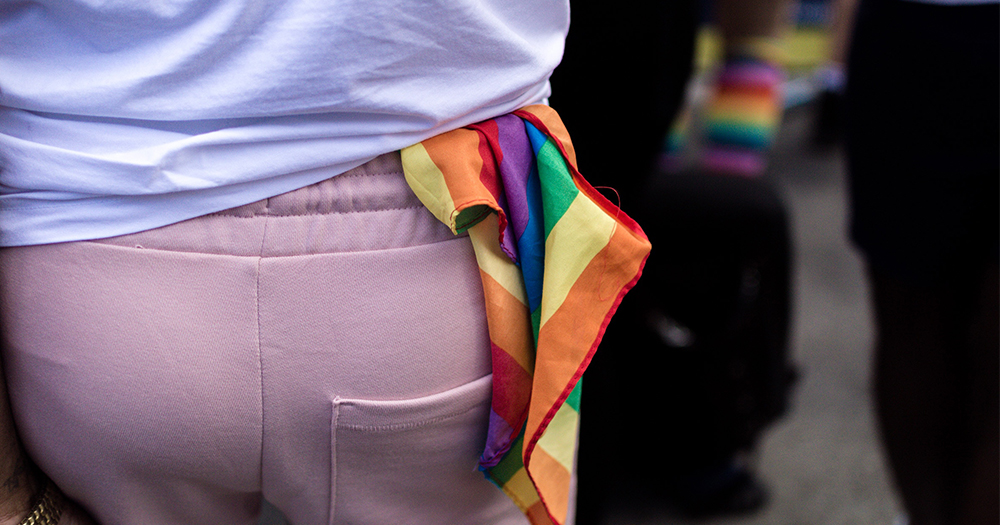I have never really been a fan of the word ‘bisexual‘. From a purely phonetic point of view it doesn’t roll off the tongue. ‘Bi’ never worked for me either. Though I appreciated its plosive brevity, telling people ‘I’m bi’ often leaves the listener wanting more. Now in my twenties, I have learned that the coming out experience is ongoing and for my own sake it was time to cop on and learn to like the word. But my lack of enthusiasm to scream ‘bisexual’ from the rooftops goes a little deeper that its linguistic roots.
Time and again I see the word in books, headlines and on TV and it’s never associated with particularly pleasant things. Bisexuals are too often fetishised as greedy and promiscuous, or, most hurtful of all, non-existent.
In my case, coming from a loving and very close-knit family where acceptance was always the watchword, I have been privileged enough that my own struggles with bisexuality have not veered beyond the trivial. For instance, I sometimes worry that I’m not ‘queer’ enough for certain venues, and I’m often left feeling subsequently silly for having to justify my presence to myself.
In navigating these doubts, all the while feeling a little bit tired of having my sexuality be the butt of jokes from straight and queer folk alike, I did what any millenial/Gen Z cusp would do and sought the council of the internet to find like-minded bis. Unsurprisingly, I found reddits, subreddits and Facebook groups connecting bisexuals and pansexuals from all genders and backgrounds enabling them to tell their stories, share memes or even just post selfies.
A common thread among the forums was the question – ‘is this bi culture?’ Examples ranged in their specificity from the music of Sufjan Stevens, to tucking baggy t-shirts into cuffed jeans, to crushing hard on Jeff Goldblum, Adore Delano, Frank Ocean and Rosa from Brooklyn 99. Amusingly, several tendencies proved to be an apparently essential part of the bi experience – a fondness for finger-guns, a ‘bisexual’ haircut (generally some form of bob with an asymmetrical fringe), and an inability to do basic maths, drive or sit properly on a chair. Admittedly, I tick four of these five boxes – I am certainly not cool enough to pull off any sort of fringe or bob, but, fearing for the safety of others and myself, I am unlikely to ever drive, and I certainly cannot do maths. There is also no way I can sit properly on a chair. In fact, when I first read about this particular trope, I was kneeling on an office swivel chair with the seat back facing my desk. It was nice to know I was not alone in my various ineptitudes.

These memes were random, self-deprecating and innocuous, generated by bis for bis, and a welcome antithesis to a narrative that places bisexuals at the crossroads of sexual promiscuity and non-existence. Additionally, the posts offered comfort and humour to a community that continues to face erasure and systemic violence. In a sense, this online world came to symbolise resistance in a society where no one seems to be asking why studies regularly suggest that 75 percent of bi women have been stalked, abused, sexually assaulted or raped.
There is power in reclaiming our narrative, in pulling out myths about bisexuality and filling the gaps with a sense of humour and a greater sense of community. More often than not, bi people experience feelings of isolation from both heterosexual people and the larger queer community. It is therefore unsurprising that bisexuals tend to be at a higher risk of experiencing mental health issues. These niche communities signify solidarity for so many who have found themselves feeling anxious, exhausted and isolated due to a constant recycling of stereotypes and erasure.
Though often labelled the ‘invisible minority’, many studies indicate that bisexual people represent up to 50 percent of the LGBT+ community, and unsurprisingly our memes represent the diversity of this population. As a subset, we’re complex, inter-sectional, cis, trans and non-binary and composed of weird and wonderful multitudes. Even if we will never be able to sit properly.
© 2018 GCN (Gay Community News). All rights reserved.
Support GCN
GCN is a free, vital resource for Ireland’s LGBTQ+ community since 1988.
GCN is a trading name of National LGBT Federation CLG, a registered charity - Charity Number: 20034580.
GCN relies on the generous support of the community and allies to sustain the crucial work that we do. Producing GCN is costly, and, in an industry which has been hugely impacted by rising costs, we need your support to help sustain and grow this vital resource.
Supporting GCN for as little as €1.99 per month will help us continue our work as Ireland’s free, independent LGBTQ+ media.
